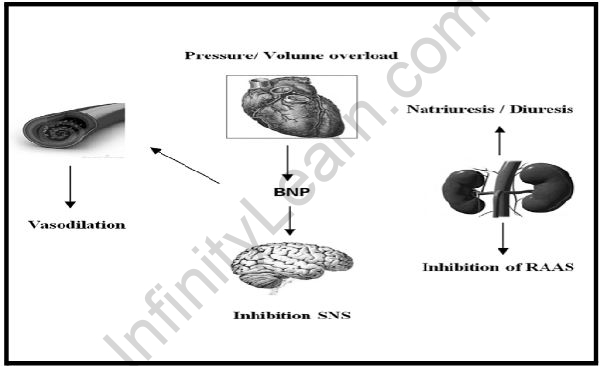Table of Contents
Natriuretic Hormones (NH) are compounds that work in the form of endocrine or paracrine to regulate extracellular fluid volume and blood pressure (BP) by stimulating the release of sodium kidneys. Three groups of compounds fall into this broad definition: natriuretic peptides (NP: ANP, BNP, and CNP), guanylin peptides (GP), and endogenous cardiac steroids (CS: ouabain, digoxin, and marinobufagenin).

Numerous evidence supports the view that in addition to their natriuretic effects, these hormones play a key role in many brain functions. Our goal is to review the established knowledge of biosynthesis, release, and physiological aspects of NH, with a particular focus on the brain. The available literature on interactions between different NH families on the periphery and in the brain is also considered.
Natriuretic Peptides
The first manifestation of the endocrine link between the heart and kidneys emerged from the first study of De Bold, which led to the discovery of the atrial NP (ANP), the founding member of the NP family. De Bold and colleagues found that injecting mice with atrial homogenate caused significant natriuresis and diuresis. Additional members of this peptide family are purified during the following years: type B of NP (BNP) and type C of NP (CNP). The ANP, BNP, and CNP are expressed as pre-pro-hormones and are processed proteolytically to form mature peptides. The three peptides share a similar structure consisting of two cysteine residues along the ring that disulfide the 17 fossils essential for biological activity. The main inducer of the ANP release is the expansion of the atrial wall. The BNP is released from the atrium, like the ANP, but its main sources are the ventricles, where the BNP is regulated by the heart wall caused by volume overload. There are three known NP receptors: NP receptor-A (NPR-A), or guanylyl cyclase A (GC-A), which binds to the ANP and BNP; NPR-B (GC-B), highly targeted at CNP; and NPR-C. NPR-A and NPR-B membrane binding receptors include the extracellular binding ligand, single transmembrane region, and intracellular GC domain that rapidly release cyclic guanosine monophosphate (cGMP) in response to NP binding. CGMP then acts as a second messenger that activates protein kinase G (PKG) and subsequent cellular cascade signals. The third receiver, NPR-C, contains only a short intracellular clip and has no GC function. The main function of NPR-C is to clear the NP through receptor-mediated insertion and degradation.
Atrial Natriuretic Factor
ANF - Atrial natriuretic factor is called heart hormone. It is a protein-based hormone secreted and secreted by heart muscle cells. Combined hormones are released into the atrium against high blood pressure by heart muscle cells. ANF - Atrial natriuretic factor is also known as ANP – Atrial natriuretic peptide or ANH – Atrial natriuretic hormone or Atriopeptin.
ANF is an important vasodilator involved in the homeostatic regulation of body fluids, sodium, potassium, and adipose tissue fat.
Atrial natriuretic factor (ANF) is a 28 amino acid polypeptide hormone produced mainly by the atrial heart in response to atrial fibrillation. ANF works in the kidneys to increase sodium excretion and GFR, counteract vasoconstriction of the kidneys, and prevent renin excretion. In the cardiovascular system, ANF opposes vasoconstriction, and it transports fluid from the intravascular to the central nervous system. In the adrenal gland, ANF is a potent inhibitor of aldosterone synthesis. ANF plays an important role in the natriuretic response to acute and chronic volume loading. The ANF factor in converting fluid from intravenous to centralized acts as a barrier, monitoring excessive plasma volume expansion when considering the total volume of external discharge. ANF is also a physiological modulator of GFR and mediates nephron hyperfiltration and natriuresis when salt depletion is threatened by a decrease in the number of nephrons. Guanylyl cyclase (GCA) receptors mediate ANF effects by producing cGMP. Clearance receptors remove ANF from circulation by receptor-mediated endocytosis and act as a hormone buffer system to prevent large negative fluctuations in ANF plasma levels. The specific structural-function-adaptive relationship of these receptors works to modify the role of ANF in the homeostasis of pressure.
Production of ANF -Atrial natriuretic factor
ANF is synthesized as an inactive peptide hormone and encoded in NPPA-natriuretic peptide A, a gene found in the short arm of chromosome 1.
ANF encrypted and generated by responding to:
- Stress or injury.
- Hypernatremia – an increase in sodium concentration.
- Increasing the sensitivity of the adrenoceptors.
- It is produced, stored, and excreted by the myocytes of the atrial heart.
- It is released in response to atrial wall extension resulting from exercise, hypervolemia, and caloric restriction.
Physiological Effects of ANF – Atrial natriuretic factor
Atrial natriuretic factor acts on various organs of the human body and is deeply involved in the following life consequences.
- ANF acts as a hormone that fights high blood pressure.
- ANF opens blood vessels to reduce pressure.
- ANF helps to reduce sodium reuptake by acting on a few components of the nephron and other internal medullary collection channels.
- ANF is also involved in increased kidney blood flow and increased glomerular filtration rate through the process of Vasodilation- dilation of blood vessels.
Frequently Asked Questions
How does ANP decrease blood pressure?
When the hormone, which has the name atrial natriuretic peptide (ANP), enters the bloodstream, it lowers blood pressure by triggering blood vessel dilation and excretion of sodium in the urine. Scientists from the University of Copenhagen and Rigshospitalet in Denmark studied the function of ANP in rats.
What does ANP do to the heart?
The main function of ANP is causing a reduction in expanded extracellular fluid (ECF) volume by increasing renal sodium excretion. ANP is synthesised and secreted by cardiac muscle cells in the walls of the atria in the heart.
How does atrial natriuretic peptide affect blood pressure?
Atrial natriuretic peptide (ANP) decreases arterial blood pressure and lowers mean circulatory filling pressure by decreasing venous compliance.



